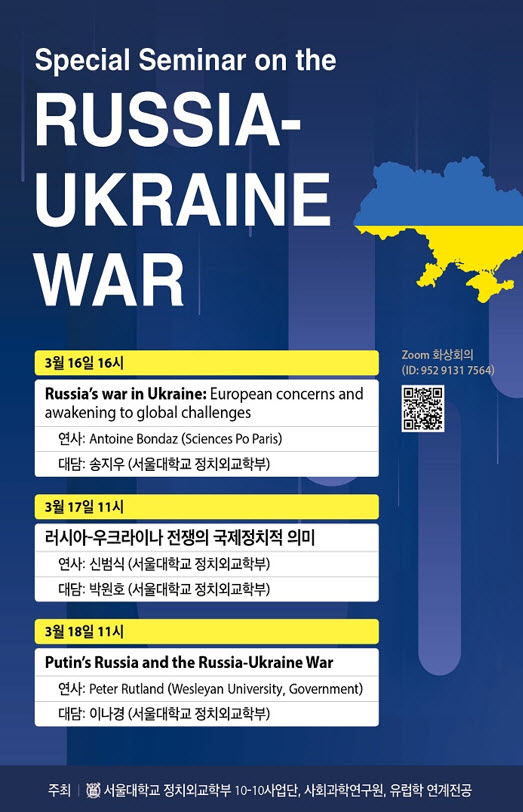From March 16 to 18, people were invited to attend a series of special seminars on the Russia-Ukraine War, a crisis that is becoming of increasing concern to the international community. The series of seminars was hosted by Department of Political Science and International Relations, Institute of Social Sciences and Program in European Studies in hopes of informing people about the causes and effects of the war as well as various perspectives regarding the significance of the war in different academic disciplines such as international relations and economics. The seminars were held online, and a total of three lectures were given during the three days of the special seminars. The final lecture of the series, titled “Putin’s Russia and the Russia-Ukraine War”, was given by Professor Peter Rutland of Wesleyan University on March 18. In his lecture, Professor Rutland conveyed his perspective on the effects of the war on the international community and focused on the idea of identity politics and how it related to the outbreak and continuance of the war.

The poster of seminar on the Russia-Ukraine War
The lecture started with an overview of the details and a timeline of the events that ultimately led to the outbreak of war. The Russia-Ukraine war has its roots in the 1991 dissolution of the Soviet Union and the resultant conflicting territorial claims between the nations as was seen during the 2014 Crimean annexation. Professor Rutland emphasized, however, that the main cause of the Russian invasion was Russia’s growing concern over Ukraine’s increasing inclination to form stronger alliances with the European Union and NATO.
Professor Rutland then stressed how comprehending the identity politics between Russia and Ukraine is key to understanding why Putin launched the war as well as why he is currently losing it. Whereas Ukrainians consider their culture and identity as separate from that of the Russians, in Putin’s identity politics, Ukraine is not separate from Russia and is a mere puppet of the West. For Putin, this justified launching the war as he does not consider it an invasion but a ‘special military operation’ that defends ethnic Russians in Ukraine and Ukrainians, who are in reality all Russians. Professor Rutland argued that the Russian soldiers “were not mentally prepared to fight a war against a hostile local population.”
During the discussion that followed, a question was raised about the possibilities for agreeable solutions to the conflict. The professor responded that given Putin's aggressive stance, as long as Ukraine does not legally recognize the secession of Crimea and Donbas to Russia, feasible solutions were unlikely. A second question was asked regarding the extent to which anti-war sentiment in Russia has leverage on Russia’s actions in the future, to which the professor replied that the anti-war movement in Russia is confined to a small minority at the moment but overtime, if the casualties and costs continue to accumulate, there may be a shift in opinion.
As the discussion section of the lecture came to a close, Professor Rutland finished his lecture, delivering his final thoughts on the war. Expressing pity at the devastating turn of events between Russia and Ukraine, he believes the war to be tragic for both sides. Professor Rutland stressed that to end the war and prevent future ones, we need to appeal to political science and sociology to study other cultures and ensure we understand them. Continuing to host international academic interactions such as these lecture series can be the first step in this process.
Written by Yeryoung Lee, SNU English Editor, yeryounglee@snu.ac.kr
Reviewed by Professor Travis Smith, Department of Asian Languages and Civilizations, tlsmith@snu.ac.kr

